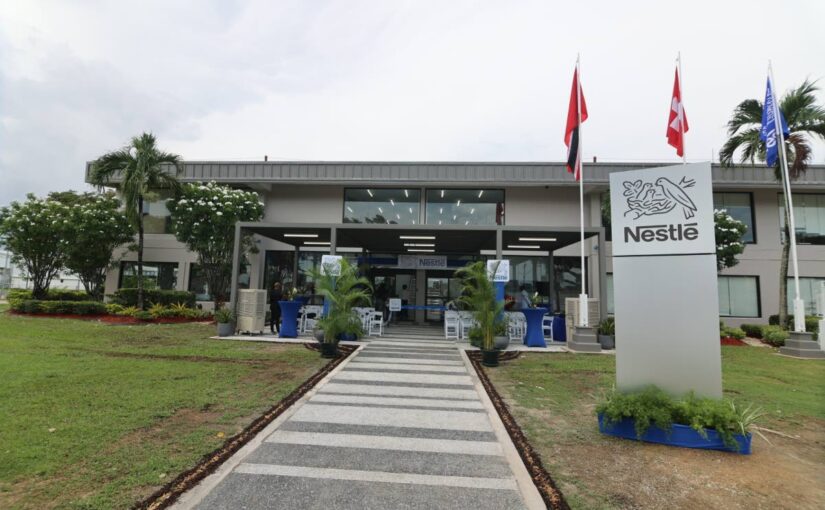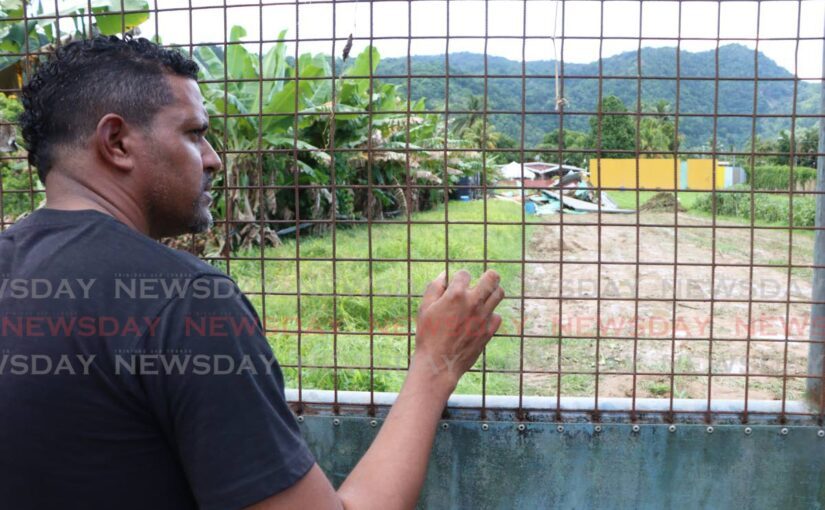FARMERS Association head Shiraz Khan has slammed the government for bulldozing crops to make way for phase two of the Diego Martin Sporting...
Vous n'êtes pas connecté
- English
- Français
- عربي
- Español
- Deutsch
- Português
- русский язык
- Català
- Italiano
- Nederlands, Vlaams
- Norsk
- فارسی
- বাংলা
- اردو
- Azərbaycan dili
- Bahasa Indonesia
- Հայերեն
- Ελληνικά
- Bosanski jezik
- українська мова
- Íslenska
- Türkmen, Түркмен
- Türkçe
- Shqip
- Eesti keel
- magyar
- Қазақ тілі
- Kalaallisut ; kalaallit oqaasii
- Lietuvių kalba
- Latviešu valoda
- македонски јазик
- Монгол
- Bahasa Melayu ; بهاس ملايو
- ဗမာစာ
- Slovenščina
- тоҷикӣ ; toğikī ; تاجیکی
- ไทย
- O'zbek ; Ўзбек ; أۇزبېك
- Tiếng Việt
- ភាសាខ្មែរ
- རྫོང་ཁ
- Soomaaliga ; af Soomaali
Rubriques :
 Maroc - NEWSDAY.CO.TT - A la Une - 29/Aug 08:22
Maroc - NEWSDAY.CO.TT - A la Une - 29/Aug 08:22
Nestle goes ‘glocal’: Global standards, local heritage
Do you remember sneaking into the kitchen late at night as a child to steal condensed milk? What about the early mornings, when you would wake up to the smell of your grandparents’ coffee? Do your remember running to the shop to get Carnation milk so your mother could finish the macaroni pie for Sunday lunch? Do you remember your parents coming to you with hot chicken noodle soup when you were sick, or now, as an adult, bringing that same soup for your children when they come down with a cold? Do you remember watching your children grow from drinking breast milk as a baby to drinking baby formula as a toddler, then eating cereal with warm milk as a little boy or girl? One way or another, the global conglomerate Nestle has been a part of those memories. Nestle’s history started in 1866 with the foundation of the Anglo-Swiss Condensed Milk Company. Henri Nestle developed the breakthrough infant formula farine lactee in Switzerland, to offer a safe and nutritious alternative to existing breast milk substitutes for mothers who were unable to provide it. The company now operates in 188 countries (for reference, the UN operates in 193) and produces more than 2,000 brands, including pet food, coffee, cereals and dairy and healthcare products. Nestle entered the Caribbean in 1914, establishing a trading agency in what is now known as Independence Square, trading products such as Nestle Sweetened Condensed Milk and, later on Lactogen and Milo. It now does business in 22 territories in the region. Nestle Anglo-Dutch Caribbean celebrated its 110th anniversary in August at Stollmeyer’s Castle, Queen's Park West, Port of Spain. But Eduardo Garcia Nestle Anglo-Dutch Caribbean market head, in an interview with Business Day on Tuesday at its Valsayn factory, said, despite its global reach, he does not consider Nestle a global company. [caption id="attachment_1105552" align="alignnone" width="1024"] Nestle's market head Eduardo Garcia displays some of Nestle's products during an interview at its Valsayn office on August 27. - Photo by Ayanna Kinsale[/caption] He said because of Nestle’s rich history in the region, its commitment to feeding the region and its mandate to use its core philosophies of innovation, respect and quality to create shared value for the region, Nestle has become more than just a global company in a local area. “Every time someone says that Nestle is a global company, I ask them: ‘Is it really?’ "We were one of the first companies to open here in TT. What is more Trinidadian than a company that started here more than 100 years ago? In Guyana, and Jamaica, our products have been there for a very long time. "We are not a global company. We are a ‘glocal’ company. We have global standards with local heritage.” Creating value, driving innovation Garcia said Nestle, whether in the Caribbean or any of the other regions in which it operates, focuses on creating shared value between the company and the communities where it is based. “I believe creating prosperous communities creates prosperous business,” Garcia said. “There is no way a company could last that long if it didn’t create prosperity for the communities, and if the people in the community do not see you as creating prosperity.” Garcia said Nestle creates that value through driving innovation in everything it does. Nestle began developing a coffee brand in 1930 as part of an initiative of the Brazilian government to help preserve substantial surplus of the country's coffee harvest. In 1938 Nestle introduced the product under the brand Nescafe. At its anniversary celebration at Stollmeyer's Castle, Minister of Trade Paula Gopee-Scoon highlighted Nestle’s development of the ultra-high temperature (UHT) process in 1972, which facilitated producing milk in Tetrapak packaging. She also pointed out innovations such as the installation of a 200ml factory line at Nestle to manufacture lunch-kit-sized options of Orchard juices in 2019, and the launch of Nestle’s Nature’s Heart line of plant-based milks in 2022, making it a first mover in the region in manufacturing dairy alternatives. “Consumers and stakeholders have been able to benefit from the application of innovation at every stage of Nestle’s operations, which have allowed it to produce new, high-quality products,” she said. During the interview, Garcia said for Nestle, innovation comes not only through its products but in everything it does. [caption id="attachment_1105553" align="alignnone" width="1024"] Cattle at Nestle's Turure Model Farm Project, Sangre Grande.- File photo by Angelo Marcelle[/caption] He told Business Day about its Valsayn factory which he said, is the most digitally-connected, ready-to-drink (RTD) factory in the company. “It is connected, not just digitally, but in the meaning and purpose of Nestle,” he said. “We are running the factory along with one of our programmes, Nestle Needs Youth, so we have people with disabilities, people who cannot hear working in the factory. For me, that’s innovation.” In another innovation, the Valsayn factory is also the first in the group to have a digitally-connected operations control tower. “Everything we do is based on local insights. "We are very proud to have full diversity, not just in gender balance but in diversity of thinking. We have people who are nutritionists, lawyers, people in finance, and professionals in everything we do.” He said the Nestle Needs Youth Programme – which was started in Europe and invites young people to seek opportunities by being part of the Nestle team – was one of its greater innovations, one that has changed the company forever. “We ended up creating a positive cycle for Nestle, because we invite youths who only need an opportunity, and by embracing younger generations we unlocked a lot of possibilities.” He said the people with experience maintain the quality of products, while the younger generations of Nestle workers provide innovations and diversity of thought. Supporting food security by enhancing industries Garcia said, as a “glocal” company Nestle holds a special interest in food security and Caricom’s goal of reducing its food imports by 25 per cent by 2030. He said, however, some things may not be able to grow on the scale needed for TT to be more food-secure, so Nestle works closely with the government to see which initiatives can be taken to enhance the efficiency of the dairy industry. “The dairy industry is very important to us in the Caribbean. We support society’s drive to open up the industry and we will continue supporting it. "I think the industry could get more efficient with a couple of initiatives, for example, better genetics for cows and better access to dairy services,” he said. One of the initiatives that focuses on better efficiency for local farmers is the “Cow Spa,” a model farm built on the Amoroso family homestead in Turure, Sangre Grande, which was intended to show farmers how to implement regenerative practices. [caption id="attachment_1105555" align="alignnone" width="824"] Nestle's branded milk product line, which includes its 100% local fresh cow's milk in the blue carton. - File Photo[/caption] “You have fans for the cows to keep them cool, the hose system to provide consistent water. It also involves how they feed and how we procure feed for the cows,” corporate communications manager Siti Jones-Gordon said on Tuesday. The farm’s upgrade came at a cost of $750,000. Jones-Gordon said Nestle is also working reducing emissions from farms to net zero. On that, it is working with the Aripo farms. “Net-zero farming requires large investments. It makes sense for a large farm to focus on implementing practices that can allow us to reduce the impact on the environment and increase volumes of milk,” she said. Garcia added that Nestle’s efficiencies and quality also give it an advantage in raising the standards of everyone involved in the industry. “Our throughput here per cow is seven litres per cow. "We could raise it to more than 20 litres. In Switzerland it is 45 litres per cow. "By increasing the throughput we can increase the income to the farmers,” he said. “But also for the consumers, if the consumers see the value of local, top-quality milk, they will buy it.” One product, Proud Land, is just that – local, top-quality dairy produced in TT. “When you see that blue box with the label '100 per cent fresh milk,' it is 100 per cent fresh, and, in this case 100 per cent local,” Garcia said. “The majority of milk we send for other islands is from a mix of local and foreign resources.” Nestle works consistently with 76 local farmers, but there has been a reduction in farmers and in milk overall. A Newsday report in 2021 said from 1995-2000, farmers were producing as much as 13 million litres a year, but at the time of that article, production had declined to about one million. Garcia said the farmers they deal with are at different stages of development. “Every farm is different. When you go to some of the farms, you would be impressed by the quality,” he said. “And then there are other farms that are still working on the basics.” He said succession planning is one of the greatest challenges to the dairy industry, as farms may not have a second or third generation of farmers to tend to the farms. “This is why we support them with quality practices.” He said in April farmers were taken to Mexico to learn from farmers there. “We sent them to learn, but they also were able to add value to the Mexican farmers. So it was a good exchange of information.” Nestle proud Garcia, who will hand over his role to Alejandro Moya, formerly country manager at Nestle Nicaragua, said for Nestle the Caribbean means everything. “We always see opportunities everywhere,” he said. “We always seek to improve ourselves and our service to the region. Every time we do not see a product on the shelf or we launch in a country, we always think how can we get better, and how can we do it the best possible way to create shared value.” Jones-Gordon said Nestle’s presence and footprint is a testament to how important Nestle is to the region. “The fact that people have chosen Nestle as part of their lives, and have had Nestle handed down to them as part of their traditions, is proof of its importance. "Now we have to think about how Nestle could go into the future with the consumer. Nestle is so much a part of who we are. “As a food producer, I could not be more proud to work for this company. I have learned and grown so much in my career here. I have been able to be exposed to so many different things. We in the Caribbean have the potential, and having a multinational company here for food in the Caribbean is a fantastic opportunity for development.” For Garcia, Nestle means opportunity, society and community. “When my kids see our brand they say, ‘Daddy, there is the nest.’ When I see them feeling proud about the brand, it makes me proud.” The post Nestle goes ‘glocal’: Global standards, local heritage appeared first on Trinidad and Tobago Newsday.
Articles similaires
Agriculture expert: Local farmers can thrive in spite of climate change
EVEN though drought, flood and heat hinder crop production, output in this country is “abysmally low,” and has been for decades, says agronomist...
Ongoing milk snag
Pine Hill Dairy (PHD) continues to grapple with production challenges that have left its popular Sungold evaporated milk absent from supermarket...
Ongoing milk snag
Pine Hill Dairy (PHD) continues to grapple with production challenges that have left its popular Sungold evaporated milk absent from supermarket...
Ken Paxton sues Texas county to block voter registration efforts
This coverage is made possible through Votebeat, a nonpartisan news organization covering local election administration and voting access. Sign up for...
Ken Paxton sues Texas county to block voter registration efforts
This coverage is made possible through Votebeat, a nonpartisan news organization covering local election administration and voting access. Sign up for...
What’s in store for Store Bay?
THE question on everyone’s lips is what’s in store for one of the most beautiful beaches in Tobago. The Tobago House of Assembly intends to turn...
Diego Martin farmers get injunction against Udecott
JUSTICE Christopher Sieuchand has granted a temporary injunction barring the Urban Development Corporation of TT (Udecott) from entering, using, or...
Skinny Fabulous wins 4 Caribbean Music Awards
ST VINCENT and the Grenadines' soca star Skinny Fabulous won four awards at the Caribbean Music Awards at Kings’ Theatre, Brooklyn, New York. He...
Food Security: Dangote Cement Ibese Donates Agricultural Inputs to Farmers in Host Communities
Group Photograph of some of the farmer beneficiaries with guests and members of management of Dangote Cement Plc, Ibese plant after the Agric...
Les derniers communiqués
-
Aucun élément








